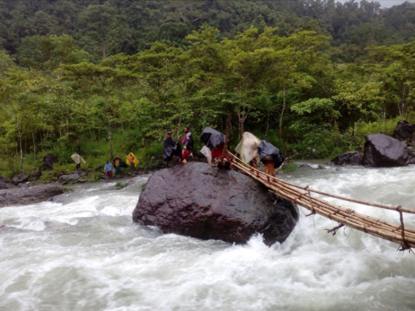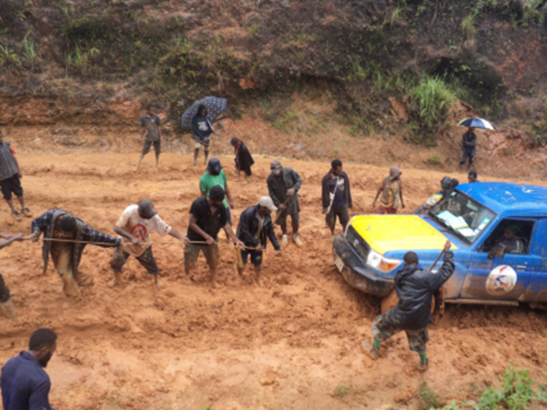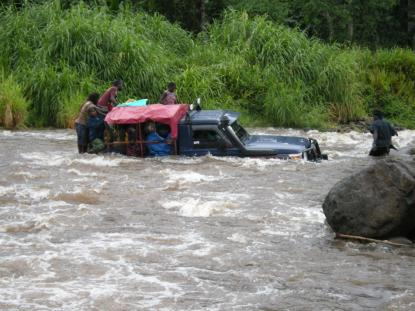Malaria transmission in PNG is the highest in the Western Pacific, 80% of cases in 2018
The Beginning
While members of the Rotary Club of Port Moresby were delivering books to children in the Port Moresby Hospital in 1996, a young girl died from malaria before their eyes. Rotarians determined that they must do something about this dreadful, deadly, debilitating disease. Hence, the beginning of perhaps the world’s biggest, ongoing project to eliminate malaria by a single Rotary Club. The impact of Rotarians Against Malaria (PNG) is unparalleled, malaria being reduced, for example, by up to 80% and 90% in highlands and Southern Regions respectively from 2009 to 2014.
Adopt a Village
In 1997, PP Ron Seddon launched the highly successful “Adopt a Village” initiative, encouraging Australian Rotary Clubs to fund long lasting Insecticide mosquito nets (LLIN) to every family in a village. Malaria was dramatically curtailed in villages that received nets.

The Global Fund for AIDS, TB and Malaria
From 2002 onwards, The Global Fund for AIDS, TB and Malaria started to inject substantial funds into countries worldwide, including PNG in 2005. At this time, RAM assisted the National Department of Health (NdoH) in moving shipping containers of nets to the provinces. However, in 2009, RAM was asked to become a Principal Recipient of Global Funds for malaria. With this, RAM PNG, in coordination with NdoH, had to scale up their operations to distribute bed nets to every household in PNG every three years, collecting accurate census data to ensure the correct allocation. Unfortunately, the Adopt a Village program was difficult to manage, and became redundant. Donations were no longer sought from Australia Rotary Clubs. An unfortunate, and unintended, consequence of this was that the interest of many Australia Rotarians waned.
The Global Fund provided a further $37 million for most of the malaria control operations in PNG for 2018-2020, in addition to substantial funding from other sources. Since 2010, RAM PNG distributed 14.5 million bed nets throughout the country. In addition, it provided training and supervision of rural medical staff in testing and treating malaria, and supported research of the NdoH and Institute of Medical Research (IMR). Even with Global Fund support, however, much more needs to be done to eliminate malaria. Apart from the important distribution of bed nets, little other support is given to many remote villages, particularly those not serviced by health services. RAM PNG, together with the NdoH, launched a program in 2020 to train village volunteers in very remote provinces on how to test and treat malaria.
RAM PNG employs 11 Regional and 6 Provincial managers (out of 22 provinces) to supervise anti-malarial operations giving in total of about 120 operational staff. The RAM PNG Team do a wonderful job but more resources are needed to reduce the incidence of malaria in this rugged, and often inaccessible country, particularly in the swampy regions of the Sandaun (West Sepik), New Ireland, New Britain and Milne Bay where incidence of malaria is as high as 232 cases/1000. RAM (PNG and Australia) is partnering with others to eliminate malaria in New Ireland. Similar partnerships in other provinces could extend the reach of RAM in PNG.

Chasing Malaria
RAM PNG expanded its operations in 2012 with the Chasing Malaria initiative to proactively seek out, treat and map malaria cases in the National Capital District, Central and Gulf Provinces, in addition to the national distribution of bed nets. When an active case of malaria is identified, the Chasing Malaria team provides an additional bed net to the patient to enhance prevention. It supervises medical facilities and provides training, diagnostic kits and drugs. Perhaps most importantly, it maps the incidence of malaria to identify hot spots for more intensive anti-malarial operations. RAM Australia has provided funding to the Chasing Malaria Program.
The RAM team fosters community involvement, working closely with communities and 11 schools on malaria education, forming school malaria clubs to identify and destroy mosquito breeding sites and to conduct malaria surveys. RAM also trains teachers in areas not serviced by health workers in testing and treatment of malaria, and supplying testing kits and drugs. It also promotes World Malaria Day activities and involvement of children in sports-based education on malaria through the Grassroots Soccer program.
Home Management of Malaria
The HMM program trains remote area community volunteers in testing and treatment of malaria. The high cost of HMM in the past has limited its expansion. Currently, a more sustainable HMM is being rolled out in seven endemic provinces with further expansion into three more provinces in 2021.

Prevalence of Malaria in PNG
From 2014 to 2017, there was a reported 9 fold increase in malaria cases in PNG (IMR). That 10% of vulnerable children under 5 years old nationally, and 20% in Saundaun (West Sepik), were infected with malaria is of concern.
Only about 50% of malaria cases are reported through health facilities. In 2019, there were 1.4 million suspected cases and 600,000 confirmed cases, averaging 170 suspected cases/1000population, up from a low of 120 cases/1000 in 2015. The range of incidence varies widely with up to 232 cases/1000 in New Ireland, to as little as 27 cases per 1000 in the highlands..
Elimination
Distribution of bed nets remains an important control strategy, but the recent resurgence of malaria suggests that other measures are also needed for elimination: reliable and simple diagnostic tests, better, safer drugs, removal of mosquito habitats, insecticide spraying inside houses, and surveillance and malaria mapping to identify hot spots.
RAM PNG highlighted to the world, the possibility of poor quality nets internationally. Since 2013, nets supplied to PNG were substandard compared with earlier supplies, contributing to the resurgence of malaria in PNG during this time. RAM, together with IMR, has published two international, scientific papers on this subject, and is now working closely with partners to identify better quality LLINs for future distribution in the country.
Last updated 19 May 2021.
